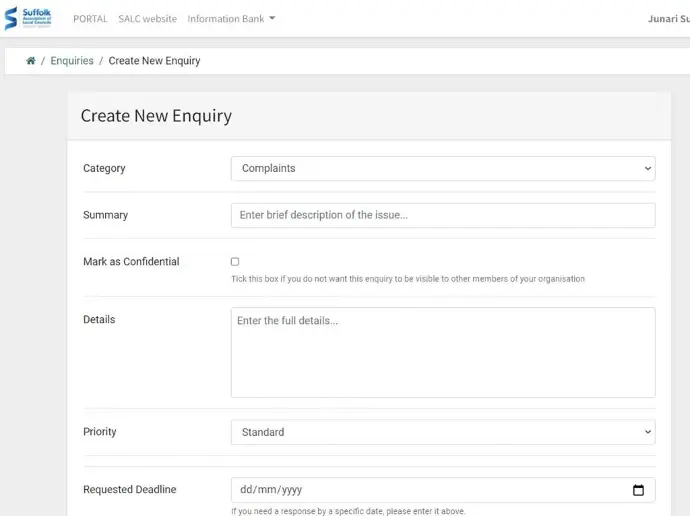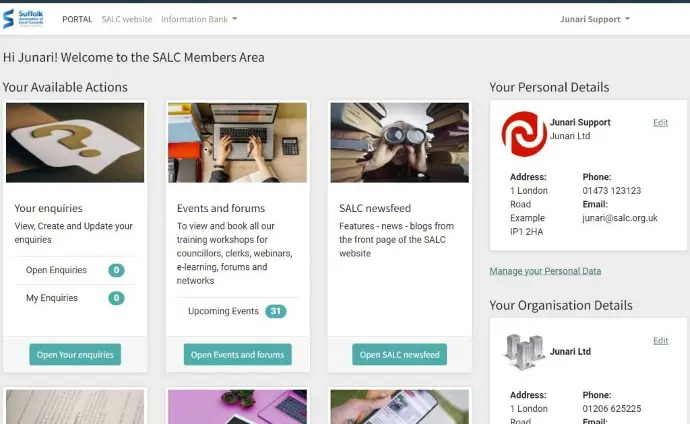
Understanding our ‘stories’
The Agile approach of defining stories to identify system processes and required outcomes helped Sally and her team to gain trust in a development methodology that was new to them.
“I’m a great advocate of defining our own processes from a user perspective, rather than leaving this to the technical team,” Sally says.
“Good digital solutions can only be achieved where they are co-produced alongside tolerances and with strong and skilled partners willing to refine and shape the end-product.
“Junari took the time to work with my team, translating the stories and ensuring they fully understood the processes.”

Critical friend
“I can sometimes go round the houses with my explanations and dependencies, but Junari always push back and challenge – in a nice way!” says Sally.
“It’s really good to have the confidence that they understand what’s needed and can come up with less Heath Robinson ideas! That builds trust too.”

Commitment
“From the beginning of our engagement in December 2020 to then starting the implementation in May 2021 Junari matched my passion and demonstrated total commitment to wanting JAMS to work for us,” says Sally.
“Their costs were reasonable, reflecting an awareness of the constraints and sensitivities of public sector spending.”
The brief
Suffolk Association of Local Councils (SALC) is one of 43 county associations around the country supporting 10,000 local councils comprising approximately 80,000 councillors Suffolk ALC itself serves 372 member organisations, representing 97% of the county’s town and parish councils.
Councils pay a subscription to become an Association member, which offers access to a range of services including guidance, support networks, news bulletins, low-cost training and sector representation locally and nationally alongside optional add-ons such as payroll and internal audit.
SALC was established in the 1950s and is built on a commitment to provide specialist support that enables local councils to excel in the performance of their duties.
Despite being a small team, SALC have been highly successful in moving their support services online without compromising quality. In many instances this has enabled it to deliver more to a wider audience.
However, like many small not-for-profit organisations, SALC was using a variety of digital applications for newsletters, event bookings and for handling support calls.
Following feedback from councils, SALC wanted to find smarter ways of working and consolidate their administrative processes to help control and manage the volume of information.

Mission
Describing the mission of organisations like her own, Sally Longmate, CEO of SALC says: “The association network saves its members from reinventing the wheel.
“We advise on a wide range of day to day issues the council is challenged with and provide practical advice to local councils in what is now a broad and increasingly complex community role.
“Not only is this offer valued by our members, but we are recognised representatives for this tier of government across the public sector network in Suffolk.
“Like many County Associations we recognise the importance of establishing key relationships with clerks and councillors who know we are always at the end of a phone.
“If we don’t know the answer, we can find an expert who does!”

Requirement
With an award-winning background in systems and processes in the public sector, Sally has a very good grasp of the challenges and opportunities that exist within the sector. She says:
“Personally I want councils to be ambitious and the best they can be – but with archaic systems I wonder if that’s possible.
“Councils take their responsibilities very seriously, including the management of public money which includes working efficiently. There are many examples of a commitment to grow their skills and develop services for the local communities they serve.
“High volumes of email traffic cascading through to clerks result in time wasted wading through duplicated information alongside existing workloads. It is unsustainable.
“It also runs the risk of important communications or opportunities being missed.
“I feel it is our responsibility to help councils and the network find ways to work smarter to help prepare for and manage potential demands and opportunities in the future, like levelling up.
How Junari Delivered
Having worked with CRM solutions in a previous role, Sally knew that this was what was needed when she came on board at SALC. She found Suffolk-based Junari via a LinkedIn recommendation and added them to her list of possible solution providers.
“As well as Junari I looked at a bespoke solution and an alternative off-the-shelf product. In the end I chose the platform with the resilience and track record to be expected from an international product – as well as the implementation partner right on our doorstep!”

Increased efficiency and better relationships
“With all the membership data in one central database we have much easier access to our contacts and greater opportunity to communicate directly with the members,” says Sally.
“Being able to identify members’ responsibilities and assets will also enable us to segment our comms and tailor information.
“This ought to help the clerks be more efficient too.”

Reduction in admin time and effort
“In just a few months we have learnt as a team to question what and how we do things, and to utilise functionality from the JAMS system. This achieves a real saving in admin time that we can give back to our members,” says Sally.
“For our events we now literally set them up and the system takes the booking, sends the joining instructions and any other information direct to the delegate.
“This means we can expand the most valued element of our service which is engaging with clerks and councillors.
“Our intention is to be more accessible thereby sharing the consequences of working smarter with the members on whom we rely for funding.”

More intelligence and insights into member engagement
“One of the most important functions of SALC is answering and managing members’ enquiries,” Sally affirms.
“Junari have implemented our members’ portal through which they can place enquiries and have access to a wide range of reference material and information.
“Not only are we capturing important data about types and volume of enquiries to help us serve our members better, but we are maximising the functionality JAMS offers us by embedding our knowledge and expertise to build resilience.
“Continual improvement in a fast-moving public sector environment is business critical and monitoring how well we deliver services and what our member experience is an important part of that.
“With members who are less engaged with us we have created capacity to reach out to them and take proactive steps to build those important relationships for the future.”

Exciting new possibilities for the sector
“It’s a travesty in this day and age that there are 43 county associations all processing information individually!” Sally exclaims.
“JAMS gives us a way to embed our material centrally and give our members access to what they need.”
Strategically Sally sees organisations such as hers cannot survive without more automated systems and processes giving the team more time to look after their members.
“Levelling Up and the County deal Suffolk has been offered requires us to have strong and resilient leaders.
“During the last two years we have been focussing on the wellbeing of councillors and clerks. This is an important investment for communities of the future.
“Data plays an important part in this too as we have seen our role develop into influencing and representing our sector.
Ultimately Sally sees that ALCs around the country could make a much more collaborative contribution to local intelligence and decision making.
“We are a gateway to local communities, and I would like to see digital mapping play its part.
“Sharing data this way across the not-for-profit sector through a system like JAMS will help a whole range of stakeholders identify gaps and support collaborative partnerships,” she says. Operationally Sally sees opportunities for member organisations to use JAMS to automate their own meetings and agendas.
“There is no reason why JAMS shouldn’t be a virtual workspace for clerks. This will provide a resilient infrastructure at council level, as well as continuity and improved succession planning as roles change,” she says. JAMS is also key in helping Associations make more efficiency gains through centralised service offerings such as payroll and internal audit services.